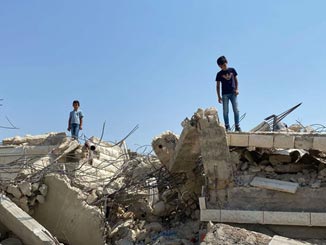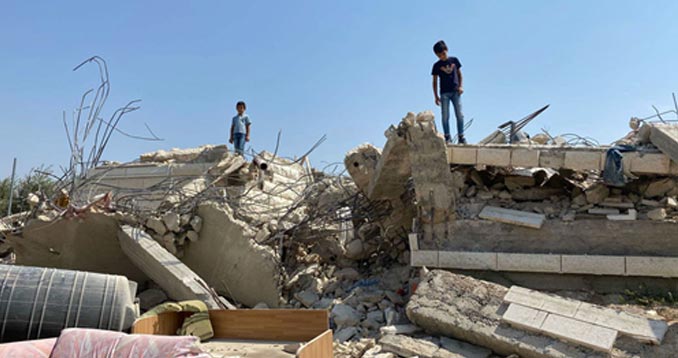

UN News The rule of law forms the bedrock of all international cooperation and the ability of multilateralism to operate effectively, Secretary-General António Guterres told the Security Council on Thursday, describing it as “foundational” to the whole United Nations.
“From the smallest village to the global stage, the rule of law (ROL) is all that stands between peace and stability, and a brutal struggle for power and resources”, he said, arguing that it protects the vulnerable; prevents discrimination; bolsters trust in institutions; supports inclusive economies and societies; and is the first line of defence against atrocity crimes.
The UN chief painted a grim picture of civilians around the world suffering from devastating conflicts, rising poverty, and surging hunger, warning that “we are at grave risk of the Rule of Lawlessness”.
From illegally developing nuclear weapons to non-sanctioned use of force, “States continue to flout international law with impunity”, he continued.
Mr. Guterres cited Russia’s invasion of Ukraine; unlawful killings of both Palestinians and Israelis; “gender-based apartheid” in Afghanistan; the Democratic People’s Republic of Korea’s unlawful nuclear weapons programme; violence and “severe human rights violations” in Myanmar; and “a deep institutional crisis” in Haiti.
“As these examples illustrate, adherence to the rule of law is more important than ever. All Member States have a responsibility to uphold it at every turn”, stated the top UN official.
Spotlighting the International Court of Justice (ICJ), Human Rights Council and its various Commissions of Inquiry, he reminded that UN entities and mechanisms promote and implement ROL.
Around the world, the UN is “mobilized against impunity and committed to holding perpetrators to account through fair, independent judicial proceedings”, said the UN chief.
“We also strengthen the rule of law by supporting victims and survivors and providing access to justice, remedy and reparation”.
Describing the ICJ as “an aspiration for accountability for the most serious crimes”, he noted the importance of accepting the Court’s “compulsory jurisdiction” and pointed to the Security Council as bearing “a special responsibility” in this.
The Secretary-General outlined how Member States can strengthen the Organization in promoting ROL by upholding the UN Charter, Declaration of Human Rights, and international law; settling disputes peacefully; advocating for equal rights for all; and committing to people’s self-determination and the “sovereign equality” of Member States.
“While the challenges are many, the primacy of the rule of law is essential to the maintenance of international peace and security and for peacebuilding efforts”, he underscored.
Negotiation, enquiry, mediation, conciliation, and arbitration, are all important tools for upholding the legal framework, according to the UN chief.
Conversely, without legal rules in place, “impunity prevails, organized crime flourishes, and there is a high risk of violent conflict”. He said the legal framework reinforced efforts to reach the 2030 Agenda and the Sustainable Development Goals (SDGs), saying that “poverty, injustice and exclusion can only be addressed through effective, non-discriminatory, inclusive public policies”.
The Our Common Agenda report – a blueprint for global cooperation and reinvigorated multilateralism – calls for a new common acceptance of legal rules that provides an opportunity to reset and reinforce them across the board at the UN.
It sets out the links between the rule of law, human rights and development, and calls for a people-centred approach in which laws and justice are accessible to all.
“The rule of law is key to addressing existing and future challenges, from nuclear disarmament to the climate crisis, the collapse of biodiversity, pandemics and dangerous diseases”, said the UN chief, adding that it must adapt to the changing environment and technological advancements.
In closing, he observed that the UN’s “legitimacy, convening power and normative impact” puts it in a unique position to promote innovation and progress in accordance with legal rules.
The Security Council has “a critical role” in broadening the ROL too: “Together, let us commit to advancing the rule of law to create a more stable and secure world for all”.
Once proclaiming their fidelity at the international level, the Judge explained that they may “not settle their disputes by using or threatening force and must be prepared to have the legality of their conduct evaluated by international courts and tribunals”.
Acknowledging that States prize their autonomy and strive to safeguard whatever power they hold, she affirmed that at the international level, “the concept of the rule of law is in a constant battle with these competing tendencies” but assured that it is not time to “wave the white flag of surrender”.
From Oxford University, Public International Law Professor Dapo Akande, drew attention to individual members of the Security Council whose ultimate responsibility it is, along with all States, to ensure the observance of international law.
When the Council collectively fails to fulfill its responsibilities, other organs of the UN such as the General Assembly or the Secretariat, are left having to take responsibility for the maintenance of international peace and security and promoting the rule of law, he said.
States should be fulfilling their duty to take “lawful steps, to bring to an end, serious violations of the most important international law obligations”.

Leave a Reply